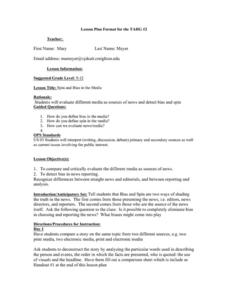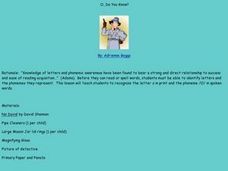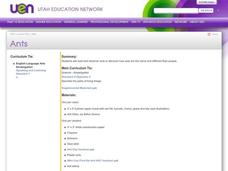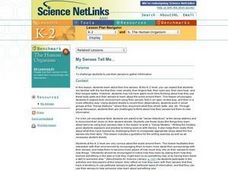Curated OER
Literacy Lesson: Guided Reading
Here is a wonderful lesson designed for learners with special needs. This well-thought-out lesson uses Big Books, familiar stories, and has a lot of review learning built into it. The book, The Keeping Quilt is used in the main part of...
PBS
How to Teach Your Students about Fake News
What media literacy skills do people need to evaluate a news source? Scholars listen to and discuss an NPR story about how fake headlines often dupe young people and adults alike. Next, they study news stories, using a fact-checking...
Shmoop
ELA.CCSS.ELA-Literacy.RI.9-10.8
Your learners need to develop skills to argue effectively, and this comes by understanding the traditions that make claims valid, and what detracts from their effectiveness. Although this resource does not give advice on how to teach...
Curated OER
Spinelli's Maniac Magee (excerpt): Reading and Critical Thinking Practice
A brief, dialogue-rich passage from Jerry Spinelli's novel Maniac Magee is accompanied by a well-written literacy assessment tool. Thematic content lends itself to age-appropriate discussions about race relations and social justice....
Curated OER
Spin and Bias in the Media
Students compare different types of media. In this media comparison lesson, students will assess the where all types of media gets its information by viewing a video of a news story and critiquing it.
PBS
Cardboard History
A PBS clip focused on collecting sports memorabilia launches this research project lesson. Class members then read Dan Gutman’s Honus and Me in which Wagner’s baseball card is used to time travel. The lesson ends with researchers...
Lesson Plansos
Guided Reading Activities with Pizzazz
Get the most out of your guided reading lessons with this collection of literacy materials. Offering a system for using color-coded tags to mark pages while reading books, as well as an assortment of comprehension and grammar worksheets,...
Curated OER
A Free and Open Press: Evaluating the Media
Students compare and critically evaluate the different media as sources of news, develop criteria for defining "news", experience the editorial process of selecting news stories and detect bias in news reporting.
Curated OER
O, Do You Know?
Students identify the short /o/ sound in this lesson. They discover that the "o" is shaped like a magnifying glass, and are "detectives" looking for the /o/ sound in words. They listen to "No, David!" and identify the short /o/ sound...
Curated OER
Citizens and the Media / Lesson : 3 Compare and Contrast Daily Newspapers for fact, opinion and bias
Students compare and contrast a variety of daily newspapers in order to detect bias. They critically analyze the role the media plays in responsibly reporting government activities.
Curated OER
What Can I Do?
Students identify how they are feeling and deal with feelings constructively. In this conflict resolution lesson, students explore their feelings through discussion. Students read and complete the What Can I Do? e-sheet. Students "think...
Curated OER
Dear Mrs. LaRue; Letter Writing
Students listen to the story about a naughty dog who writes to his owner in letter form. In this writing a letter instructional activity, students pretend to write to a character in the story and practice their literacy skills. Students...
Curated OER
Under the Umbrella
Young scholars complete a variety of activities related to the short /u/ sound. As a class they recite a tongue twister, then trace and write the letter U. Students then listen to a list of words and identify the words containing the...
Curated OER
A Nero Wolfe Mystery
Discuss a Nero Wolfe mystery on brining criminals to justice. Secondary students will read the book A Nero Wolfe Mystery: The Doorbell Rang. They then will watch the movie depicting this story and answer discussion questions. There are...
Curated OER
Haunting Music
Students discover music that was inspired by the spooky and bizarre. In this music of Hector Berlioz and Camille Saint-Saens lesson, students identify elements of music and listen to the Symphonie Fantastique and Danse Macabre. Students...
Curated OER
Harriet The Spy
Fourth graders investigate the style of diary writing as its own genre of literature. They read Harriet The Spy in order to have a text for this literature study. Students use the skill of prediction to preview the story, and then...
Curated OER
Quality of Information: Point of View and Bias
Fifth graders identify stereotypes of Indian people based on perceived characteristics. They discuss the misconceptions. Students define quality of information and give an example from the story "Seaman's Journal: On The Trail With Lewis...
Curated OER
Ants
Students listen to the story Ant Cities by Arthur Dorros, and discuss the ways that ants are similar to people. They create a butcher paper mural of an ant colony that includes hills, tunnels, rooms, grass and sky.
Curated OER
Crossroads Cafe: Who's the Boss Act 2
Students watch a video and practice their prediction and discussion skills. Students watch a view of "Who's the boss" and practice pronouncing words from a worksheet. Students describe emotions and facial expressions they detect from...
Roald Dahl
The Twits - The Twits Get the Shrinks
Turn readers into investigative journalists. The 11th and final lesson that accompanies The Twits by Roald Dahl asks the question "What happened to Mr. and Mrs. Twit?" The lesson uses mind maps and group discussion to help answer the...
Curated OER
My Senses Tell Me...
Students work at "Sense Stations" to explore each of the five senses.
Curated OER
Much Ado About Something (Lesson 2)
Students view more video clips of Shakespeare's plays. They answer comprehension questions over the video. They are introduced to the language Shakespeare used as well.
Curated OER
Using Primary Sources to Discover Reconstruction
Fifth graders discover how reconstruction had an impact on racial issues in the United States. In this Reconstruction instructional activity, 5th graders are introduced to primary vs. secondary resources and then rotate through stations...
Curated OER
My Senses Tell Me...
Students explore how to use their sense to draw conclusions. In this human biology lesson, students use their senses to observe various objects in learning centers. The centers include tasting salt, touching sandpaper, hearing bells and...

























